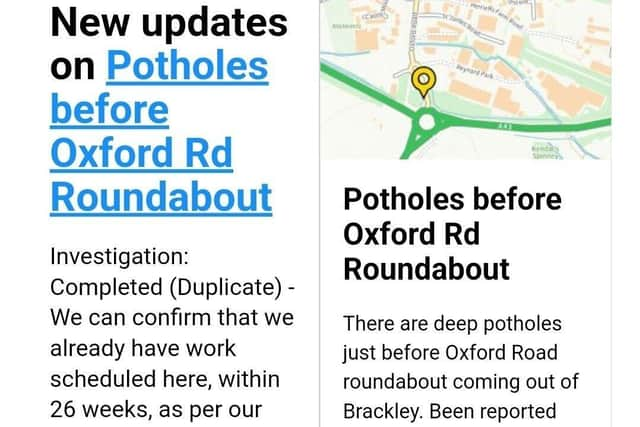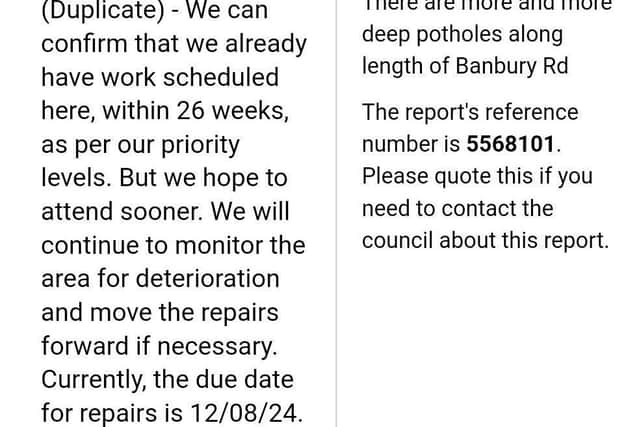Claims that the government has delayed pothole repair in Banburyshire have been disputed
and live on Freeview channel 276
West Northamptonshire Council (WNC) said its use of six month delays in repairing some potholes was due to DfT national guidance it was obliged to adhere to.
But a DfT statement to the Banbury Guardian said it was the responsibility of local authorities to assess the risks of potholes and decide on adequate timescales for repair.
Advertisement
Advertisement
The issue arose after pothole campaigner Mark Morrell – aka Mr Pothole – claimed that WNC was ‘abusing’ the Highways Act in order to prevent paying out drivers’ compensation claims for damage caused by potholes.


He said if the council had scheduled a pothole for repair for six months’ time, any claims in that period would be rejected.
Mr Morrell said WNC paid out compensation for only one claim last year. And he described WNC’s excuse that the DfT had imposed the rules was ‘a cop out’.
“I think it's just smoke and mirrors. They are hiding behind whatever they can to give an answer, when the reality is they make their own rules in terms of what they do under the risk based intervention criteria. It's a cop out,” he said.
Advertisement
Advertisement
The DfT said in a statement: "Changing from reliance on specific guidance and recommendations in the previous Codes to a risk-based approach determined by each Highway Authority will involve appropriate analysis, development and gaining of approval through authorities’ executive processes.”


The department said its code for local authorities was:
- Prevention is better than cure – intervening at the right time will reduce the amount of potholes forming and prevent bigger problems later
- Right first time – do it once and get it right, rather than face continuous bills. Guidance, knowledge and workmanship are the enablers to this
- Clarity for the public – local highway authorities need to communicate to the public what is being done and how it is being done - DfT code of practice."
Mr Morrell said: "Those are the ideals and if we can get to that situation, it would be great. But the reality is, many councils, including West Northants, as we know, well have not achieved them. That's partly to do with funding but it's also a question of management.”
He said although WNC had scheduled the deep potholes on the main A422 Banbury Road at Brackley for repair by August 12, some have already been fixed following publicity.


“They have done the worst ones. However, there's another four that are getting nearly as bad,” he said.
Advertisement
Advertisement
Last week WNC councillor Phil Larratt told the Banbury Guardian: “There are four categories for defects across the network which outline the order of priority, the severity of the problem and the response times for these. They are: 1 - 24 hours; 2 - seven days; 3 - 28 days and category 4 - 26 weeks.
"The priority given depends on several factors including category of road and size and depth of defect. Those which qualify as a priority 4 are deemed to not need immediate action and can be dealt with in up 26 weeks."
- A press spokesman for West Northants Council said today (Tuesday): “When claims are submitted legal precedent is set that allows councils to defend claims where the categorisation is valid and the published timelines for repair has not been breached. The national code of practice provides guidance on how to implement an asset management policy.
- The current inspection manual, which outlines how the council inspect and categorise defects on our network is based on the recommendations contained within, our approach is common with those across authorities up and down the country. West Northamptonshire Council are however currently in a position where we consistently achieve an average response well in advance of currently defined timelines and are reviewing whether we can make a more ambitious commitment in our upcoming inspection manual update.


Mr Morrell said: “West Northants Council paid out only one successful claim last year, almost showing it off as some kind of badge of honour. All it is, is they've got better at playing the system to avoid paying out and claims.
"The Banbury road’s a perfect example. I sent WNC my photographs and asked if they were seriously going to leave those for up to six months? Surprise, surprise, the worst ones got filled in. I think I need to take photos of the other four that are now nearly as bad.”
Advertisement
Advertisement
He said if a local authority had inspected a pothole and deemed it was insufficiently dangerous to be left for up to six months, it would not pay out for a compensation claim, no matter how much worse it had become.
“They would reject their claims on that basis,” he said. “However, it's not been tested in law yet. Because previous test cases were judged on the critical issue of the pothole being 40mm in order for a claim to be successful. It was it was tested in court in Liverpool years ago, and that was that golden rule.
“That's now been overturned in favour of the risk-based decision strategy, so it's not actually been tested properly in court yet.”
Mr Morrell said he had written to a lawyer expert in legal matters for cyclists to ask for definition on the law with regard to potholes and damage they can cause to road users.